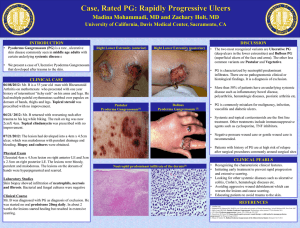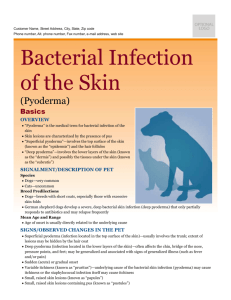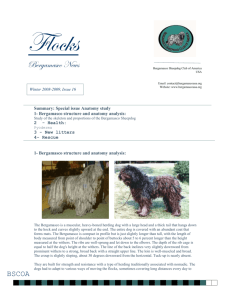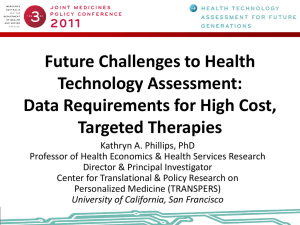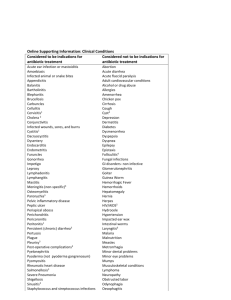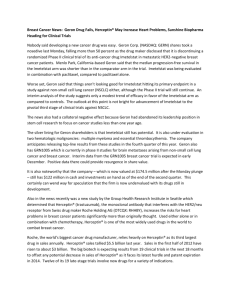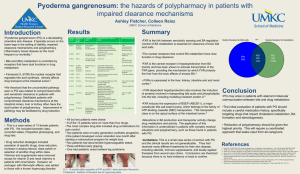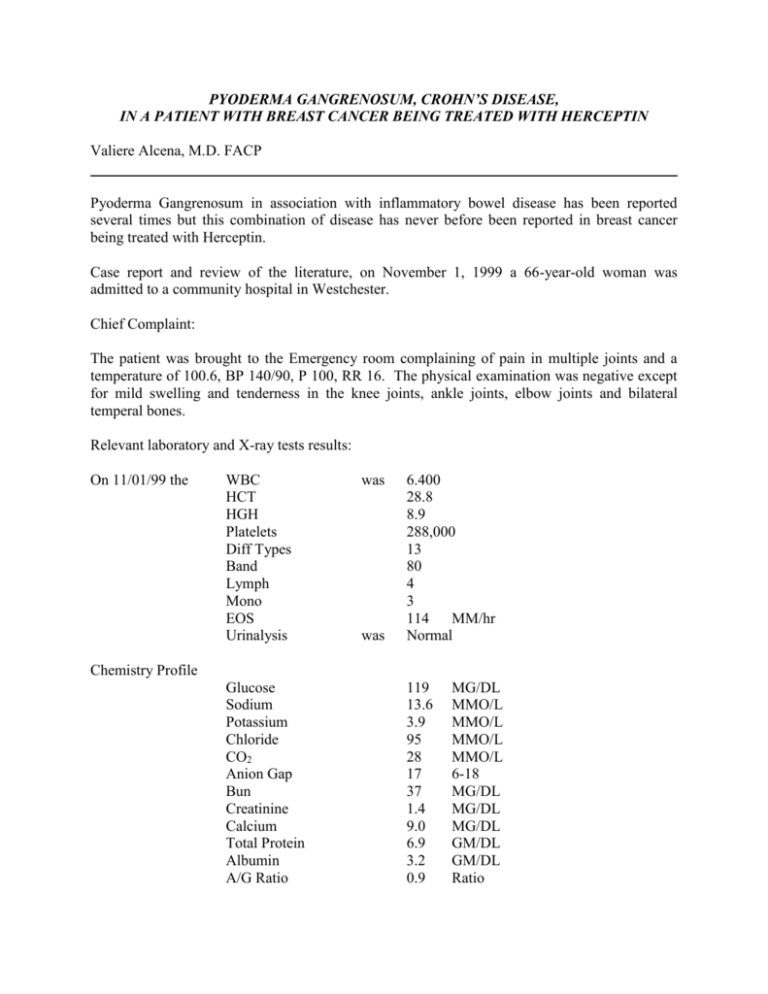
PYODERMA GANGRENOSUM, CROHN’S DISEASE,
IN A PATIENT WITH BREAST CANCER BEING TREATED WITH HERCEPTIN
Valiere Alcena, M.D. FACP
Pyoderma Gangrenosum in association with inflammatory bowel disease has been reported
several times but this combination of disease has never before been reported in breast cancer
being treated with Herceptin.
Case report and review of the literature, on November 1, 1999 a 66-year-old woman was
admitted to a community hospital in Westchester.
Chief Complaint:
The patient was brought to the Emergency room complaining of pain in multiple joints and a
temperature of 100.6, BP 140/90, P 100, RR 16. The physical examination was negative except
for mild swelling and tenderness in the knee joints, ankle joints, elbow joints and bilateral
temperal bones.
Relevant laboratory and X-ray tests results:
On 11/01/99 the
WBC
HCT
HGH
Platelets
Diff Types
Band
Lymph
Mono
EOS
Urinalysis
was
was
6.400
28.8
8.9
288,000
13
80
4
3
114
MM/hr
Normal
Chemistry Profile
Glucose
Sodium
Potassium
Chloride
CO2
Anion Gap
Bun
Creatinine
Calcium
Total Protein
Albumin
A/G Ratio
119
13.6
3.9
95
28
17
37
1.4
9.0
6.9
3.2
0.9
MG/DL
MMO/L
MMO/L
MMO/L
MMO/L
6-18
MG/DL
MG/DL
MG/DL
GM/DL
GM/DL
Ratio
Total Bilirubin
Alkaline Phosphatase
AST
Uric Acid
Blood Cultures
Urine Cultures
Chest X-Ray
EKG
0.7
MG/DL
98
U/L
41
U/L
7.9
MG/DL
Negative
Negative
Negative
Normal
The patient was treated with Vancomycin, 1 gram IV every 12 hours and Fortaz, 1 gram IV
every 8 hours, and Indocin 50 mg 3 times per day by mouth.
Past medical history:
The patient has breast cancer. She had mastectomy several months ago and has been treated
with radiation therapy and at the time of this admission she was being treated with 5 FU
Methotrexate and Cytoxan.
Because her tumor is HER2 positive, she was being treated with weekly Herceptin IV.
In addition, she has hypertension and was being treated with Norvasc 10 Mg per day; Moduretic
5/50, one tablet daily.
The following day on 11/2/99, the patient developed multiple pus filled lesions over multiple
areas of her body. In addition, she developed marked swelling of both ankles, elbows, wrists and
both temporal bones. Materials aspirated from these lesions were negative for bacteria and
culture of this material grew no bacteria fungus or Acid Fast organism.
She required surgical drainage incision and debridments of several of these lesions.
On 11/5/99 her
WBC
was 13.700
HGH
9.2
HCT
29.9
MCV
75.6
Platelets
241,000
ESR went up to
122
ANA was equivocal VDRL
Serum protein electrophoresis was no diagnostic
MM/H
Serum immuno globulin level was
IGA
256 nl
60-400
MG/DL
IGG
1690
700-1500
MG/DL
IGM
77
60-300
MG/DL
Skin Biopsy was consistent with Pyoderma Gangrenosum.
The patient was treated with Prednisone 60 mg by mouth daily.
Pyoderma Gangrenosum lesions
Figure 1
Draining Lesions on Left Should and Left Upper Arm
Figure 2
Open Lesion and Swelling of Right Ankle
Figure 3
Swelling and Draining Lesions of Right Wrist and Right Hand
Skin Biopsy Slide
Figure 4
A.
B.
Acute ulceration, Neutrolphylic Micro Abscess and Acute Inflammation
Consistent with Pyoderma Gangrenosum
Necrosis With Abscess of Skin
The patient had been diagnosed with iron deficiency anemia prior to this acute illness. Her HCT
dropped to 24.2 on 11/19/99. She was transfused with 2 units of packed red cells and a GI work
up was started first with upper endoscopy, which was unremarkable.
On February 2000, after the healing of all her skin lesions and termination of Prednisone
treatment, she was colonoscoped. The colonoscopic examination showed a lesion in her sigmoid
colon, which shows Crohn’s Disease.
Figure 5
Ulcerated Lesions Seen During Colonoscopy
Figure 6
Pathology Slides of the Sigmoid Lesion Showing Superficial Ulceration, Acute
Inflammatory Exudate and Granulation Tissue Consistent with Inflammatory Bowel Disease
Serum Antibody tests done by Genentech, Inc. of South San Francisco, CA, the maker of
Herceptin, was negative for F (ab’)2 antibody (IgG) and IgE response to Herceptin was negative.
The patient is now being treated with Ferrous Sulfate 325 mg 3 times per day for iron deficiency
resulting from chronic blood from the Crohn’s disease on and ASOCAL for the Crohn’s disease.
She is off Prednisone and the Pyoderma Gangrenosum lesions have healed.
Her Herceptin treatment was restarted with no adverse effects.
DISCUSSION
Pyoderma Gangrenosum is a well-described dermatological disease associated frequently with
Vasculitis, autoimmune diseases and inflammatory bowel disease (occasionally few cases of
idiopathic Pyoderma Gangrenosum have been reported.)
When this case first presented, it was felt that she could be one of those idiopathic cases because
there was never a report of a case of Pyoderma Gangrenosum associated with breast cancer or
any cancer. Further there has never been a case of Pyoderma Gangrenosum reported in a patient
being treated with Herceptin, though herpes Zoster and skin ulcerations have been described in
an occasional patient receiving Herceptin treatment.
However, since the patient was proven to have iron deficiency anemia, a gastrointestinal workup became necessary to explain this finding. An upper GI endoscopy was done and failed to
reveal any abnormalities to explain the iron loss. Because the patient was very ill and was in the
process of receiving surgical debridment treatments to treat several of her ulcerated skin areas,
Colonoscopy was deferred until 2/7/2000, when it was done and it revealed that indeed the
patient has Crohn’s disease of the sigmoid colon.
This then puts into place the missing piece of the puzzle that she has Pyoderma Gangrenosum
with Crohn’s disease, in association with Stage II HER2 positive breast cancer.
What role, if any, the breast cancer played in her developing Pyoderma Gangrenosum is not
clear. This is the first case of anyone with breast cancer developing Pyoderma Gangrenosum
ever reported in the literature.
Herceptin (Trastuzumad) is a recombinant DNA-derived humanized monoclonal antibody that
binds selectively to HER2 breast cancer cells to inhibit their growth. Breast cancer cells over
express HER2 are very aggressive and are associated with poor prognosis and poor overall
survival.
Herceptin works well to prevent the growth of these cells, thereby improving the survival of
individuals with HER2 positive breast cancer. Herceptin clearly had no role in Mrs. V.S.’s
developing Pyoderma Gangrenosum. The people of Genentech, Inc., were very helpful, diligent
and highly professional in dealing with the case of Mrs. V.S. and I thank them for that.
SUMMARY
A case of Pyoderma Gangrenosum in association with Crohn’s disease, HER2 positive Stage II
breast cancer on Herceptin is presented. The patient responded well to treatments with
Prednisone and surgical debridment. The Herceptin, which was withheld for several months,
while laboratory investigations, etc. were going on, was restarted with no adverse effects and the
patient is doing well and is completing treatment with CMF.
REFERENCES
Pyoderma Gangrenosum. A comparison of typical and atypical forms with an emphasis
on time to remission. Case review of 86 patents from 2 institutions.
Medicine (Baltimore). 2000 Jan; 79(1): 37-46, Review.
PMD: 106709408: UI: 20135304.
Archer JV, et al.
Pyoderma Gangrenosum Affecting the Foot. A case report.
J Am Podiatr Med Assoc. 1999 March: 89(3): 141-2. Review.
PMID: 10095337: UI: 99195041.
Callen JP
Pyoderma Gangrenosum and Related Disorders.
Med Clin North Am. 1989 Sep;73(5): 1247-61. Review.
PMID:2671544; UI: 89363665.
von den Driesch P.
Pyoderma Gangrenosum: A report of 44 cases with follow-up.
Br J Dermatol. 1997 Dec;137(6): 1000-5.
PMID: 9470924; UI 98131700.
Powell FC, et al.
Pyoderma Gangrenosum: Classification and Management.
J Am Acad Dermatol. 1996 March:34(3):395-409; quiz 410-2. Review.
PMID: 8609250: UI: 96178007.
Lear JT., et al.
Neutrophilic Dermatoses: Pyoderma Gangrenosum and Sweet’s Syndrome.
Postgrad Med J. 1997 Feb;73(856):65-8. Review.
PMID 9122099: UI: 97247432.
Matis WL, Ellis CN, Griffiths CEM, et al.
Treatment of Pyoderma Gangrenosum with Cyclosporine.
Arch Dermatol.
1992;128:1060-1064
MEDLINE
ACKNOWLEDGEMENTS
I would like to thank my colleagues Dr. Chris Honig for help provided in preparing the skin
biopsy slides, Dr. Yasmin Yusuf for help provided in preparing the Sigmoid biopsy slides and
Dr. Robert Antonelle for providing the photographs taken during the colonoscopy.
Request for reprint = Valiere Alcena, MD, FACP
Prestige Medical News
37 Davis Avenue
White Plains, NY 10606
Current Author’s Address:
Prestige Medical News
37 Davis Avenue
White Plains, NY 10606
www.prestigemedicalnews.com
E-Mail: dralcena@aol.com
Copyright© 2000 Valiere Alcena M.D., F.A.C.P., F.A.A.C
All Rights Reserved

